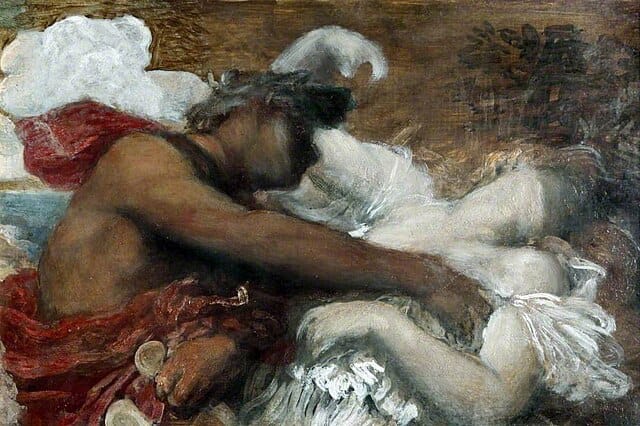Goodbye Music, Goodbye Muse

Is this millennia my penance?
This year, this hour, to sing repentance?
To weep upon a single flower
and never a happy song endow?
The clouds rendered to rude calligraphy,
and sublime passions eluding me.
Uncanny spirits from the shadows black
harmonize until Music comes back.
For I am immortal in your ballad,
and she, immortally dead, harried
forth to Hades dusky lair.
No song of mine saves her from there.
So goodbye Music, goodbye Muse.
Goodbye, Life, if I abuse
thy elegy to raise another.
I — the world’s immortal lover.
For its enticement, lyrics sweet,
penned in the hours before we meet,
my Reader, I beg, to release me
from this elegiac memory.
If I don’t see her, I shall die.
Yet revived by a scholar’s sly
curiosity of my ancient tragedy —
twists turmoil to sadistic symphony.
In my heart, I’ll sing thee quiet.
My blue passions did the gods disquiet.
I’ll style thee with verses mute
and evermore neglect the lute.
The flute, the harp, and yes, the lyre
shall never again rekindle thy fire.
Thy memory in peace retire.
In silence, Music rings much higher.
Process
In many Romantic poems, a protagonist with high standing, whether divine or social, endures a sudden or gradual loss of self, ending up with no purpose in life but to wander liminal spaces and tell the story of who they once were to whoever will listen. Romantics seem obsessed with this concept: the idea of a loss of self so deep, all that is left of you is the memory of your downfall. Life becomes a slow funeral procession, an extended eulogy, for one who ‘will die a death so lone and incomplete’ (Isabella, stanza LXI).
I thought no figure best embodied this concept as Orpheus, famed for his notes so mournful they changed the hearts of Persephone and Hades, allowing him a final chance to save his lover from death. Infamously, his attempt failed, and he was reduced to mournful ballads ever since. Among the Romantics, Keats takes a particular interest in love tragedies, asking through his poetry, why do readers love suffering so much? It borders on masochism, and he calls on Music to turn away from Isabella once she is in turmoil over her lover’s death (stanza LXI). All beauty is not gone in grief, he believes, but there is something brutal in seeking out the elevated beauty of pain.
This is the idea I took into my own poem, styled after Keats’s rhyming couplets in Isabella and other poems. The poem tells of Orpheus who, grown tired of existing in mythology only in the moment of his heartbreak, breaks himself out of the cycle by falling silent. He claims it would be akin to betraying his lover to sing of her death any longer, especially for the gratification of ‘a scholar’s sly curiosity’. He rejects the tragic fate by becoming even less than a memory — becoming silent.